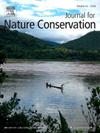欧盟环境犯罪指令2024/1203:法律解决方案和观点
IF 2.5
3区 环境科学与生态学
Q2 BIODIVERSITY CONSERVATION
引用次数: 0
摘要
本研究分析了通过刑法保护环境的指令(EU) 2024/1203中概述的环境犯罪。该指令旨在克服执法部门在应对日益增多的环境犯罪方面整体效率低下的问题。根据先前的指令2008/99/EC的规定,环境犯罪日益增多,从而加强对欧盟环境立法的遵守。为此,它制定了刑事和非刑事处罚的最低标准,澄清了关键术语,并为刑事起诉的需要提供了评估环境损害的指导。该研究的目的是确定指令2024/1203引入的最重要的变化,并检查其对环境保护的潜在影响。分析表明,新指令使用了更精确和有针对性的语言,应有助于各成员国更一致地执行其规定。制定明确的环境犯罪标准将为执法部门提供一个明确的框架,以建立刑事案件,限制潜在的混乱,减轻法律挑战的风险。新指令无疑是欧盟环境刑法的一个里程碑,因为它包含了如何提高其有效性的许多方面,从而有助于改善环境。本文章由计算机程序翻译,如有差异,请以英文原文为准。
The EU environmental crime directive 2024/1203: Legal solutions and perspectives
This study analyses environmental offences outlined in Directive (EU) 2024/1203 on the protection of the environment through criminal law. The Directive aims to overcome the overall inefficiency of law enforcement response to the increasing number of environmental crimes under the provisions of the previous Directive 2008/99/EC enhancing compliance with EU environmental legislation. It does so by setting minimum standards on criminal and non-criminal penalties, clarifying key terms, and providing guidance on assessing environmental damage for the needs of criminal prosecution. The aim of the study is to identify the most significant changes introduced by Directive 2024/1203 and examine their potential impact on the protection of the environment. The analysis showed that the new Directive’s use of more precise and targeted language should facilitate more consistent implementation of its provisions across Member States. Establishing explicit criteria for environmental offences will provide law enforcement with a well-defined framework for building criminal cases, limiting potential confusion and mitigating the risk of legal challenges. The new Directive is certainly a milestone in the EU’s environmental criminal law, as it contains many aspects on how to improve its effectiveness and thus can contribute to improving the environment.
求助全文
通过发布文献求助,成功后即可免费获取论文全文。
去求助
来源期刊

Journal for Nature Conservation
环境科学-生态学
CiteScore
3.70
自引率
5.00%
发文量
151
审稿时长
7.9 weeks
期刊介绍:
The Journal for Nature Conservation addresses concepts, methods and techniques for nature conservation. This international and interdisciplinary journal encourages collaboration between scientists and practitioners, including the integration of biodiversity issues with social and economic concepts. Therefore, conceptual, technical and methodological papers, as well as reviews, research papers, and short communications are welcomed from a wide range of disciplines, including theoretical ecology, landscape ecology, restoration ecology, ecological modelling, and others, provided that there is a clear connection and immediate relevance to nature conservation.
Manuscripts without any immediate conservation context, such as inventories, distribution modelling, genetic studies, animal behaviour, plant physiology, will not be considered for this journal; though such data may be useful for conservationists and managers in the future, this is outside of the current scope of the journal.
 求助内容:
求助内容: 应助结果提醒方式:
应助结果提醒方式:


